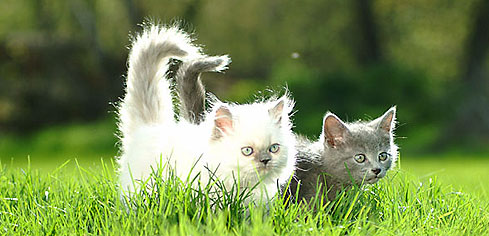 |
Dental Care |
Thought humans were the only one who needed dental attention? Cats need regular dental care too!
Here are some things you can do to keep your cat’s teeth healthy:
- Clean your kitten's teeth 2 or 3 times a week. In a cup of water, pour a teaspoon of baking soda and with this solution, gently rub the kitten's teeth with a soft cloth. When your cat gets his or her adult teeth, brush them periodically with a special animal toothpaste and toothbrush. Do not use toothpaste formulated for humans, because pets swallow rather than spit out the preparation, this may cause stomach upset.
- Have your cat's teeth examined at least once a year by a qualified veterinarian.
- Give your pet appropriate toys to prevent teeth fractures.
- Give him food formulated to help prevent plaque buildup and remove tartar.
Here are some problems that may occur if a cat doesn’t receive a regular ‘check-up’:
| Problems |
 |
Effects |
 |
 |
| Tartar build-up |
bad breath
irritation and possible infection of gums
eventual loss of teeth
|
| |
|
| Cavity or tooth fracture |
pain
destruction of tooth |
| |
|
| Impacted baby teeth |
displacement of other teeth
difficulty in chewing |
| |
|
Did you know?...
By four weeks of age, kittens have their incisors, the 12 small teeth in the front of the mouth. At six weeks, all 26 deciduous teeth are in. Between 11 and 30 weeks, kittens lose their deciduous teeth and gain 30 permanent teeth. During this period, a kitten may eat slightly less because of sore gums. Kitten teeth should be white and clean, with the upper incisors meeting the lower incisors evenly. The gums and mouth tissue should be pink; a pale colour is a sign of anemia.
|


